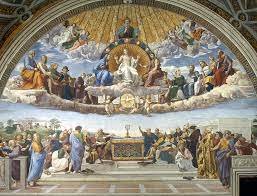Define, "Believing."
Recently, while professing the Nicene Creed at Mass, I reflected on how years of reciting Saint Peter's sermon (Acts 2) have changed my attitude about life.
A common word in the first sentence among the four predominant paragraphs of The Profession of Faith articulates centuries of what Christians believe and affirms what I believe IN. I believe IN God, His Son, Jesus Christ, and the Holy Spirit.
Consider this: when we say, 'I believe in…' instead of 'I believe that...,' we're not just expressing a belief, we're making a profound statement. The phrase 'I believe in...' carries a tone of motivation, passion, and inspiration, revealing a clear understanding of our beliefs. But why is this distinction so significant? How does it shape our attitudes and actions? It transforms the believer into a different person, acting differently towards themselves and others.
Be Aware! 'Believing in' can truly transform individuals. Those who have known me for a while have witnessed a significant change in my behavior. Friends, family, and colleagues have all been surprised. Is it complex? Not at all. Let me share a personal example. When asked to attend a luncheon with a few buddies, the destination was "Hooters." In responding to the invite, my choice was to decline. Why? The atmosphere, staff, and aim of the establishment objectify women in a way that reduces their dignity. Let's face it, the reason for a restaurant is the food.
When I say, "I believe that..." it borders on a less meaningful certainty and hints toward a deficiency of confidence. The difference between "believing that" and "believing in" is noted by a decisive response to the latter. In other words, I might say, "I believe that I can swim across the lake," but the likelihood of me acting on that statement is low. The word "that" in the statement is a clue I might not be so sure.
On the other hand, when I say "I believe in" while reciting the Nicene Creed, I am making a solemn commitment based on cherished convictions close to my heart and mind. This is not a simple task. Trust is also intertwined with 'believing in' as my decisions about living a life with Christ are influenced by The Creed. I trust in the history of the Church and its proclamation (325 A.D). Just like the Fathers of the faith during antiquity, a communal promise is made among the faithful and, therefore, requires belief and trust in the community.
Let's delve into the historical context of the Nicene Creed. Early Christians had to stop and decide what they really believed in during antiquity. The foundation of thier findings can be summed up in, "Faith is man's response to God who reveals himself and gives himself to man, simultaneously bringing man a superabundant light as he searches for the ultimate meaning of his life." CCC,26
 Now, for readers who may claim this article is more about semantics than faith, I say, believe! My approach to writing this narrative is to make you a believer.
Now, for readers who may claim this article is more about semantics than faith, I say, believe! My approach to writing this narrative is to make you a believer.I conclude with a question and encouragement. What are some ways that saying "I believe in" can assist social transformation today?
Reflect on your own beliefs and consider the transformative power of 'believing in 'versus 'believing that '. Let's explore this together...


Comments
Post a Comment
I would like to hear your thoughts.